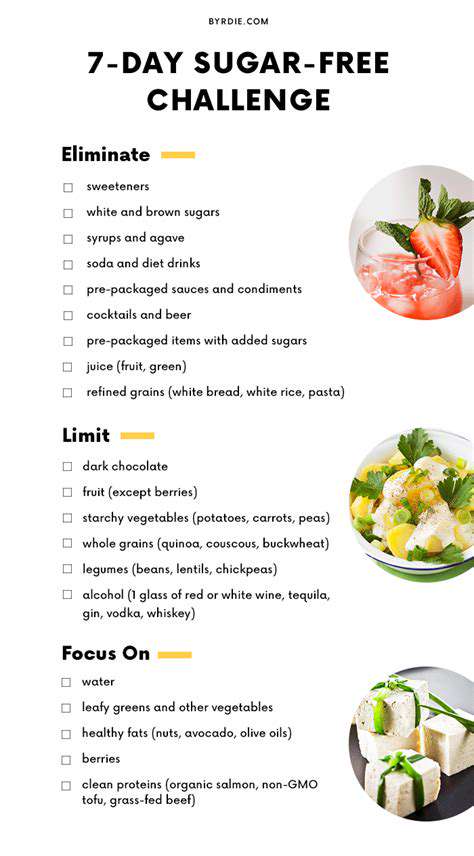Low Sugar Meals: Balanced and Flavorful
Introduction to Low-Sugar Eating

Understanding the Importance of Low-Sugar Diets
Shifting to a low-sugar eating pattern can profoundly transform your health trajectory. Cutting back on sugars—both added and naturally occurring—delivers measurable benefits for physical and mental wellness. Many people experience steadier energy levels as blood sugar fluctuations diminish, while others notice improved weight management since sugary snacks often pack empty calories. Perhaps most importantly, reducing sugar fosters a healthier gut microbiome, which scientists now recognize as vital for robust digestion and immune function.
Research consistently links excessive sugar consumption with serious health concerns like metabolic disorders, cardiovascular issues, and even some cancers. Making intentional choices to limit sugar represents one of the most effective preventive health measures available to everyone. This dietary adjustment serves as a cornerstone for building long-term wellbeing and creating resilience against chronic diseases.
Identifying Sources of Added Sugars
Modern food processing techniques have made sugar ubiquitous in unexpected places. Becoming a savvy label reader helps uncover hidden sugars masquerading as ingredients like evaporated cane juice, barley malt, or dextrose. Beyond the obvious culprits like soda and candy, watch for sugar lurking in salad dressings, condiments, and healthy snack bars. Restaurant meals frequently contain surprising amounts of added sweeteners, even in savory dishes.
Cooking more meals at home using whole ingredients provides the ultimate control over your sugar consumption. When dining out, don't hesitate to ask about preparation methods or request modifications to reduce added sugars in your meal. Developing this awareness transforms grocery shopping and meal selection into powerful health-promoting activities.
Benefits of Reducing Sugar Intake
The physiological improvements from cutting sugar often appear quickly and dramatically. Many report enhanced mental clarity and more stable moods as their blood sugar stabilizes. This metabolic balance translates to better focus throughout the day without the typical afternoon energy crashes. Dental professionals universally applaud reduced sugar intake for its cavity-preventing benefits.
Body composition changes frequently occur naturally when decreasing sugar, as this automatically reduces empty calories while improving nutrient density. The combination of better energy utilization and reduced inflammation creates ideal conditions for sustainable weight management. These cumulative benefits demonstrate how a single dietary change can positively impact multiple health parameters simultaneously.
Strategies for Implementing a Low-Sugar Diet
Successful transitions to low-sugar eating begin with manageable adjustments rather than drastic overhauls. Gradually replacing sugary staples with wholesome alternatives allows taste preferences to evolve naturally. Experiment with flavorful spices like cinnamon and vanilla to satisfy sweet cravings without actual sugar. Batch cooking nutrient-dense meals prevents reliance on processed convenience foods when hunger strikes.
Partnering with a nutrition professional provides customized strategies tailored to your unique physiology and lifestyle demands. These experts offer evidence-based guidance for navigating social situations, managing cravings, and ensuring nutritional adequacy throughout your sugar-reduction journey. Their support often proves invaluable for creating lasting dietary changes.

Simple Swaps for a Low-Sugar Lifestyle

Simple Swaps for Sweet Treats
The world of naturally sweet flavors offers endless possibilities for satisfying desserts without refined sugar. Ripe seasonal fruits provide nature's perfect sweet package, complete with fiber and beneficial plant compounds. Nutrient-dense options like dark chocolate-covered strawberries or banana nice cream demonstrate how delicious sugar-free treats can be.
Breakfast presents prime opportunities for sugar reduction. Swapping out sugary cereals for steel-cut oats topped with almond butter and blueberries creates a satiating meal that naturally limits sugar while boosting protein and healthy fats. These thoughtful substitutions cumulatively reshape your palate's expectations of sweetness.
Substituting Sugary Drinks
Liquid calories from sweetened beverages represent one of the most significant and unnecessary sugar sources in modern diets. Transitioning to unsweetened alternatives requires some creativity but delivers immediate health dividends. Sparkling water with a splash of pure pomegranate juice offers festive bubbles without sugar overload. Herbal iced teas brewed with fresh mint or ginger provide refreshing complexity without sweeteners.
For coffee lovers, gradually reducing added sweeteners while increasing quality allows the bean's natural flavors to shine. Over time, your taste buds adapt to appreciate subtler sweetness levels. Keeping infused waters with citrus slices or cucumber readily available makes hydration appealing and effortless.
Healthy Alternatives to Desserts
Redefining dessert as a celebration of natural flavors rather than a sugar bomb transforms your relationship with sweet treats. Baked pears with walnuts and a drizzle of tahini create a sophisticated finish to meals. Chia seed pudding made with coconut milk and topped with toasted coconut flakes satisfies cravings while providing omega-3s and fiber.
The art of low-sugar baking utilizes ingredients like almond flour, coconut flour, and nut butters to create satisfying textures. Pureed dates or mashed bananas can replace some or all of the sugar in many recipes while adding nutritional value. This exploratory approach to dessert-making often leads to discovering new favorite flavors and textures far superior to sugar-laden industrial desserts.
- Smart Food Storage: Keep Your Groceries Fresh Longer
- Exploring Italian Pasta Dishes: Beyond Spaghetti Bolognese
- Baking for Beginners: Easy Recipes to Master
- High Protein Vegan Meals: Delicious Plant Based Power
- Speedy Weeknight Dinners: 15 Minute Chicken Stir Fry
- Cooking with Spices: A Beginner's Flavor Guide
- Quick & Easy Stir Fries: Healthy and Delicious
- Kitchen Decor Ideas: Stylish and Functional
- Understanding Food Labels: What to Look For and Avoid
- Cooking for Special Diets: Allergies and Intolerances
- Simple Beef Recipes: Versatile and Delicious
- Understanding Micronutrients: Vitamins and Minerals